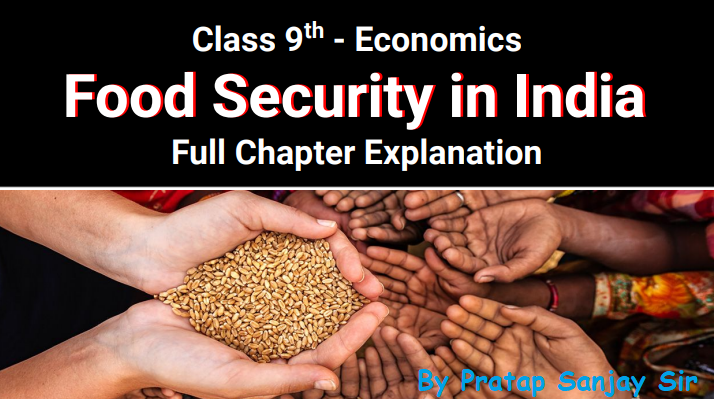
What is Food Security?
➥ Food security means that everyone has access to enough food at all times. It is based on:
- Availability of food (how much food is produced and stored).
- Accessibility (food must be available to all people, even in remote areas).
- Affordability (everyone should be able to buy nutritious food).
➥ For food security to be ensured:
- There should be enough food for all.
- Everyone should have enough money to buy good quality food.
- There should be no obstacles to access food.
Why is Food Security Important?
➥ Food security becomes a problem during natural disasters like droughts, which cause food shortages. This can lead to increased prices, and many people may not be able to afford food. If the shortage lasts too long, it could cause starvation, which could develop into a famine—a situation where many people die from hunger and diseases.
Who Are Food-Insecure?
➥In India, many people face food insecurity:
- Vulnerable Groups: These include people with no land, low-paying jobs, or those who rely on seasonal work, like daily laborers.
- Social Groups: People from certain communities, such as SC, ST, and OBC, are more likely to face food insecurity because they often have less land or low-quality land.
- Migrant Workers: People who move from one place to another in search of work are often food insecure.
- Women and Children: Pregnant women, nursing mothers, and children under five years old are also at high risk of food insecurity.
➯ Hunger can be chronic (always having too little food) or seasonal (related to farming cycles, like before harvest time).
Food Security Measures in India
➥ After independence, India aimed to produce enough food to be self-sufficient. The Green Revolution helped increase food production, making India capable of handling food shortages and avoiding famines.
Components of Food Security in India
Buffer Stock
➥ The government buys surplus food (mainly rice and wheat) from farmers at a fixed price called Minimum Support Price (MSP). This helps stabilize food prices and ensures there is enough food during shortages.
Public Distribution System (PDS)
➥ The Food Corporation of India (FCI) distributes the food to poor people through ration shops. People can buy food grains at subsidized prices.
What is Buffer Stock?
➥ Buffer stock refers to extra food grains (wheat and rice) stored by the government. The FCI buys the grains from farmers at the Minimum Support Price (MSP). These grains are stored and used to help people during food shortages. The grains are sold at a lower price than the market price to help the poor.
What is the Public Distribution System (PDS)?
➥ PDS helps make food available to people at affordable prices. It was introduced to prevent food shortages, especially during the Bengal famine. The system works through ration shops that sell food grains like rice, wheat, sugar, and kerosene at subsidized prices.
- Revamped PDS (RPDS): Introduced in 1992.
- Targeted PDS (TPDS): Introduced in 1997, this targets the poorest families.
- Special schemes like Antyodaya Anna Yojana (AAY) and Annapurna Scheme (APS) were launched for people in need.
Problems with the PDS:
- Wasteful Buffer Stocks: A high amount of food grains are kept in stock, which is not always needed.
- Malpractices: Some ration shop dealers sell food grains in the open market or sell poor-quality grains.
- Targeted PDS Issues: Families above the poverty line (APL) get little benefit because the price is almost the same as the open market price.
Role of Cooperatives in Food Security
➥ Cooperatives, especially in southern and western India, help provide affordable food to the poor. Some famous cooperatives include:
- Mother Dairy (Delhi)
- Amul (Gujarat)
- Academy of Development Science (ADS) (Maharashtra)
➥ These cooperatives sell low-priced goods, helping to improve food access.
Subscribe to My Channel




0 Comments